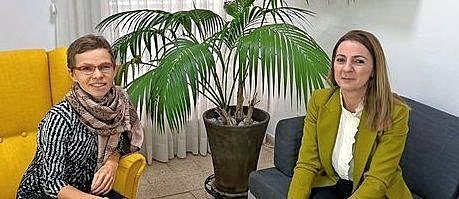Israel-Polish diplomacy Aided by Ukraine war
The war in Ukraine helped to resolve a bitter diplomatic crisis between Israel and Poland over the Holocaust, Warsaw’s acting ambassador to Israel said over the weekend.
Chargé d’affaires Agata Czaplińska’s remarks, which came days after the countries announced that they were mending ties, reveal the extent to which external geopolitical factors played a role in the diplomatic rapprochement as both sides seek to move past discord on Holocaust-related issues.
Czaplińska, who has been serving as acting ambassador over the last year, said that Israel’s decision to reinstate its ambassador to Poland last year, three days after the outbreak of the war in Ukraine, to help extricate citizens and refugees from the war-torn nation, played an instrumental role in improving relations between the two countries.
“This move undoubtedly contributed to strengthening our relationship,” Czaplińska told JNS at the Polish embassy in Tel Aviv.
She said that the Israeli ambassador to Poland, Yacov Livne, had “contributed substantially” to the agreement announced in Warsaw last Wednesday and that without his “very active role” and interaction with Polish officials over the last year the process would have taken much longer.
The accord will see Poland restore its ambassador to Israel, and the resumption of Israeli youth visits to Poland for Holocaust education.
“The circumstances on our eastern border [with Ukraine] required the presence of the [Israeli] ambassador…and contributed to the improvement in our relations we are experiencing now,” she said.
Poland has served as the key gateway from Ukraine during the war, which is now in its second year.
A Polish ambassador to Israel is expected to take up his position in the months ahead after a two-year absence.
Ties between the countries had nosedived after Poland’s government enacted laws that were seen as whitewashing Poles’ role in the Holocaust, and then banned claims for restitution of seized property by Holocaust victims and their heirs.
The agreement reached sought to move beyond those disputes.
Czaplińska said that the dispute over the security for and the content of the Israeli youth exchanges to Poland — which had been frozen for three years under the shadow of the diplomatic crisis and then COVID-19 — had been amicably resolved.
According to the agreement, Polish security will provide protections for the Israeli youngsters in coordination with Israeli security officials, she said.
Poland has long sought to provide security for the groups in place of Israeli guards.
“We consider Poland to be a safe country despite the threats on our eastern border,” she said in the interview. “The security for Israeli groups — which are not affected by that — will in any case be much higher…even though there is no comparison compared to the potential risks they face in many other countries, including in Western Europe.”
Regarding the content of the youth trips, the acting ambassador said that each side will present the other with recommended sites to visit in their respective country, such as museums, to get a broader understanding of the centuries of history the two peoples’ shared before the Holocaust. It will be up to each side to decide on the exact itinerary for their youths, she said.
“We wanted to include in the program of the visit places important to the 1,000-year common Polish-Jewish history,” Czaplińska said. “We want the youths to get to know Poland, not just as a place where the atrocities of the Holocaust took place, but the common history and contemporary Poland.”
A key point of agreement is that the youth trips will include more interactions between young Israeli and Poles to counter prejudice and stereotypes, something that had only happened on an ad hoc basis before and will now be institutionalized.
“Letting young people get to know each other is the perfect vehicle for understanding and cooperation,” Czaplińska said.
Poles’ role in the Holocaust has long been a source of tension between the two countries. The debate intensified over the last several years after the governing nationalist coalition in Poland sought to depict Polish crimes as a marginal phenomenon and focus almost exclusively on the Poles who helped Jews during the Holocaust.
Six million Jews, including 98% of the roughly three million Jews living in that part of Poland occupied by Germany in 1939, were killed by the Nazis and their collaborators during the Holocaust.
About 350,000 Polish Jews survived the war; most lived in the Soviet-occupied zone of Poland during 1939 and 1940 and fled east ahead of the German advance in 1941.
Until the dispute broke out, tens of thousands of Israeli teens traveled to Poland on educational trips each year, touring former Nazi camps to learn about the Holocaust and memorialize those murdered. The trip has long been considered a rite of passage in Israeli education and the best way to study the Holocaust.
Israeli President Isaac Herzog is expected to visit Warsaw next month for the 80th anniversary of the Warsaw Ghetto Uprising, the 1943 revolt by Jews in German-occupied Poland.






